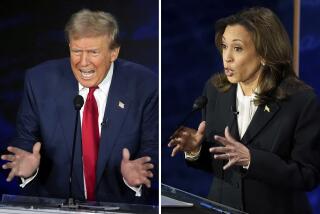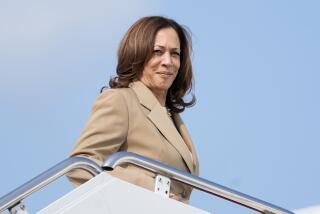Voter Wariness Ups Stakes in New Hampshire Debate : Democrats: Forum tonight gives candidates the chance to carve out an identity in a state where ‘undecided’ leads polls.
- Share via
MANCHESTER, N.H. — A month before the New Hampshire primary lays its make-or-break scythe into the Democratic presidential field, the candidates are scrambling around the state’s countryside and flooding the local airwaves in ever more frenetic efforts to sell themselves to voters.
They are finding very cautious buyers.
In every poll taken in New Hampshire recently, the “undecided” category ranked higher than any candidate. And according to party activists, campaign strategists and voters, what support there is for individual candidates is soft and susceptible to change.
These uncertainties have perceptibly raised the stakes surrounding a debate tonight among the five major Democratic candidates that will be televised statewide.
“The truth of the matter is . . . there is a large percentage of people (in New Hampshire) who just don’t know any of us,” said one of the contenders, Nebraska Sen. Bob Kerrey.
While the forum may go little-noticed outside New Hampshire, it marks the unofficial start of the sprint toward New Hampshire’s Feb. 18 primary. The candidates are framing the contest as a referendum not only on themselves but on the future ideology of the Democratic Party, which has been engaged in a dispute over its traditionally liberal bent.
This year’s short campaign season has forced the Democratic candidates, none of whom enjoys a wide national following, into an uncomfortable two-step: making a positive impression among voters while simultaneously knocking their opponents.
By week’s end, four candidates--all except former California Gov. Edmund G. (Jerry) Brown Jr.--were on the air with ads, some explaining simply who they are, others keying on specific issues. And although the rhetoric is still fairly muted, the cross-campaign bickering has stepped up in recent days.
Former Massachusetts Sen. Paul Tsongas has taken particular aim at Kerrey for commercials in which the Nebraskan advocates a tough trade policy against Japan. Tsongas notes that Kerrey’s ads began airing shortly after he hired the Washington-based political consultants who in 1988 created similar ads for then-presidential candidate Richard A. Gephardt.
The Kerrey ad, Tsongas said, “is pure, hired-gun, Washington media consultant politics. It is a substitute for an economic package.”
Kerrey, for his part, is staking a claim to the health care issue, and he derided the other candidates’ proposals as half-hearted at a Nashua senior citizens forum last Friday. Kerrey has proposed universal health care to be funded by a 5% payroll tax.
“Don’t accept a counterfeit bill in this campaign,” he said. “Accept the genuine thing and fight for it.”
Arkansas Gov. Bill Clinton, who with Tsongas is the marginal leader in voter polls, has begun airing a commercial that takes an indirect shot at Kerrey and another presidential foe, Iowa Sen. Tom Harkin.
The commercial, whose message Clinton reinforced last week on campaign stops, criticizes “the politicians in Washington” for raising their own pay. It is a clear reference to the Congressional pay raise that Kerrey and Harkin supported.
Harkin began running commercials in recent days that are generic recitations of his desire to “rebuild America” with massive public works programs like those that proliferated during the Depression.
As he troweled cement at a sewer project in Manchester one day last week--Harkin routinely spends a day on various jobs to demonstrate his affinity for workers--the Iowa senator castigated his opponents as Republicans in disguise.
“The main distinction between me and those others that are in this race is I’m the only real Democrat,” Harkin said, shivering in near-zero temperatures.
Using what has become one of his favorite phrases, he referred to his rivals as “microwave Democrats”-- hot on the outside but cold on the inside.
Although Clinton and Tsongas take umbrage to that description, their campaigns represent a challenge to the traditional Democratic orthodoxy practiced by Harkin. And so far, they appear to have benefited from their positioning.
Both have decried traditional liberal solutions to the nation’s economic crisis as a recipe for electoral disaster.
“Our job today is to change the Democratic Party once and for all to a party that understands you can’t be pro-jobs and anti-business at the same time,” said Tsongas, who talks almost exclusively about the economy during his low-key travels in New Hampshire.
Clinton, speaking to hundreds of enthusiastic supporters at the opening of his Keene campaign headquarters, went so far as to describe traditional liberal and conservative labels as “a load of bull.”
“We use labels to shed more heat than light,” he said when a supporter asked how he defined himself. “We use labels as an excuse to stop thinking.”
The fifth major Democratic candidate--Brown--has maintained a low profile in recent days in his self-described “insurgent campaign” to turn the political system on its head. The other candidates have virtually ignored his presence in the race.
But they are not likely to have that luxury in tonight’s debate, if history is any guide. Brown eclipsed the others in a nationally televised debate last month by aggressively pitching the 800-number that people can call to contribute to his campaign.
Harkin and Kerrey, meanwhile, are expected to attempt to derail Clinton, the grudgingly acknowledged front runner.
Although Tsongas is keeping pace with Clinton in the New Hampshire polls, the Arkansas governor is viewed as the more serious long-range threat because of his organization and perceived appeal in other states. A win by Clinton in New Hampshire, combined with a good showing in the several Southern primaries that follow less than a month later, could set him on the road to the nomination.
TV Coverage
Tonight’s debate among the five major Democratic presidential candidates will be televised live in Southern California on the C-SPAN cable network from 4 p.m. to 6 p.m. It will be repeated on C-SPAN from 8 p.m. to 10 p.m.
More to Read
Get the L.A. Times Politics newsletter
Deeply reported insights into legislation, politics and policy from Sacramento, Washington and beyond. In your inbox twice per week.
You may occasionally receive promotional content from the Los Angeles Times.











